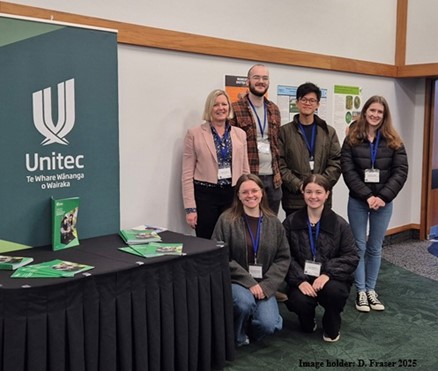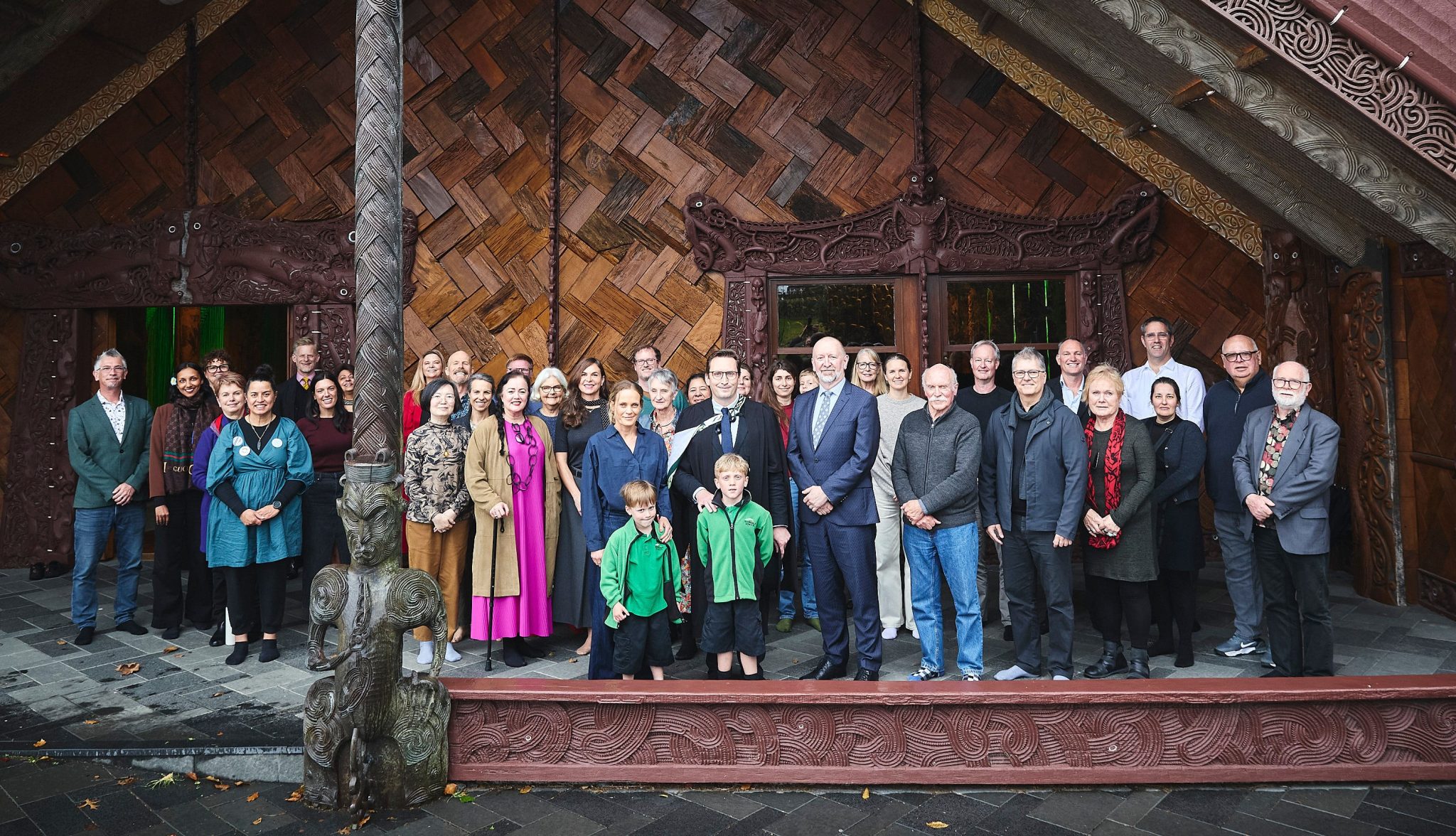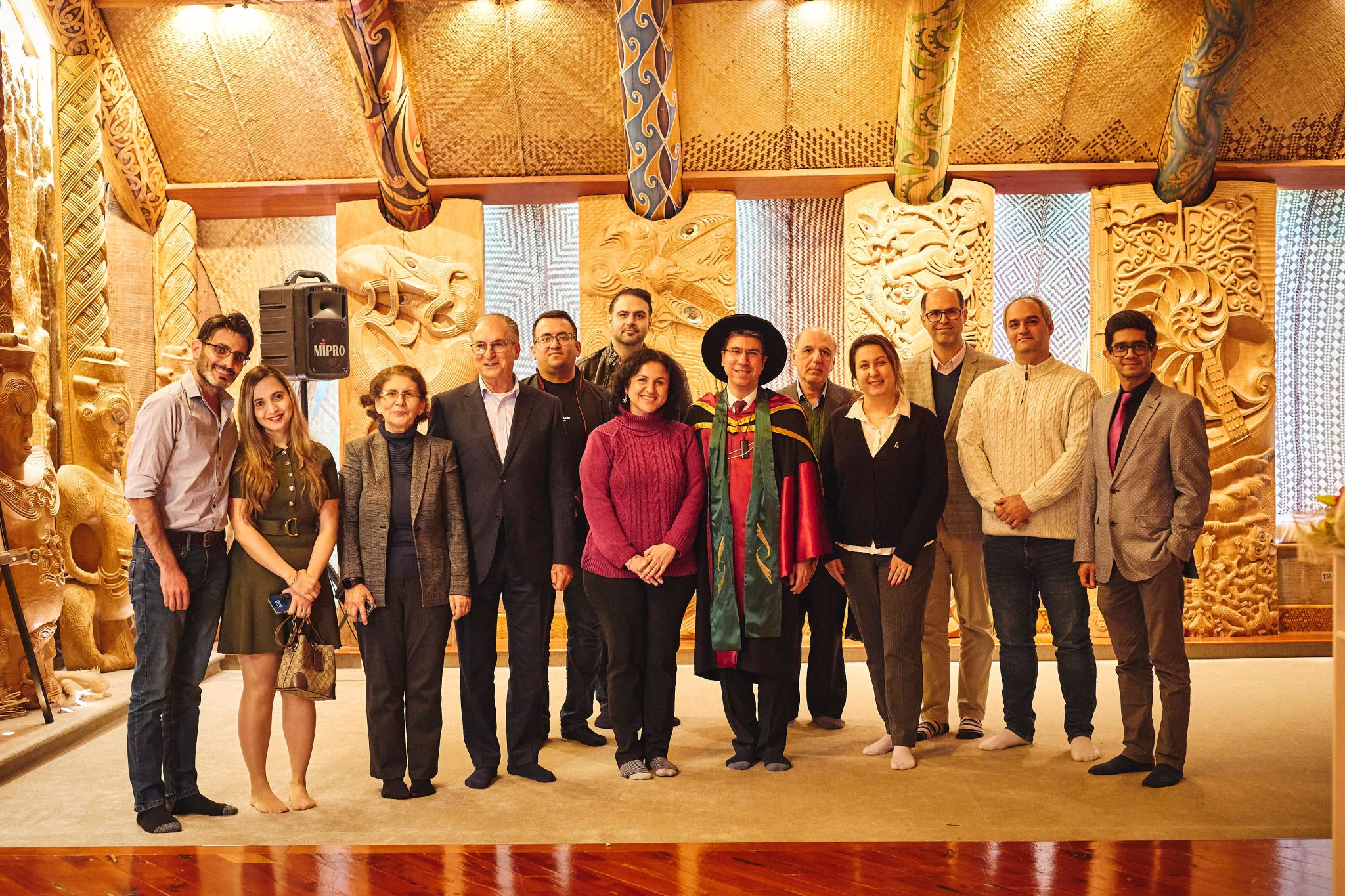Five of our Bachelor of Applied Science (BASCI) ākonga recently presented their research at the New Zealand Biosecurity Institute’s (NZBI) NETS (National Education and Training Seminar) Conference in Palmerston North.
The theme for NETS 2025 was Haumaru koiora kia pai āmua – Biosecurity for a better future and included collaborations between Unitec kaimahi and Auckland Council.
For the past decade, students from the School of Environmental and Animal Sciences (EAS) have showcased their research projects at the annual NETS conferences.
“There is a need for more biosecurity education and professional development for the industry and action is underway to investigate the provision around New Zealand and the role that NZBI can take in increasing awareness and access to this education,” says Associate Professor, Diane Fraser.
Assoc Prof Fraser, who has been instrumental in providing these opportunities for our ākonga, says our third-year undergraduate research students present at this conference.
“I applaud all the students for having the courage to step up to this challenge. In addition, I thank all participants of NETS for being so supportive at the conference and for the provision of research and work opportunities.”
Amy Gwynne (pictured below) is a recent graduate of the Post-graduate Diploma in Applied Science (Biodiversity Management) and completed the required dissertation on the identification characteristics of the highly invasive Himalayan wineberry (Rubus ellipticus var. obcordatus (Franch.) Focke).

The species is currently present on the North Shore in Albany, where it was first recorded.
Amy looked at the potential spread and impact in Aotearoa using GIS (Geographic Information System) modelling and an analogue species (Japanese wineberry).
The modelling results showed that the Auckland, Bay of Plenty, Christchurch and Nelson regions were at the highest potential risk for invasion of Himalayan wineberry.
Amy was supervised by Professor Peter de Lange and Assoc. Prof. Fraser and supported by Lydia Starr and Kelly Wooton from Auckland Council and Dr Glenn Aguilar from Unitec. She also received funding by Auckland Council.
Since graduating, Amy has gained employment as a Quarantine Officer with the Ministry for Primary Industries (MPI) and is enjoying her training.

Jemma Owen (pictured left) is a recent graduate of the BASCI (Biodiversity Management major).
Her Negotiated Research project involved a laboratory trial to determine if the lilly pilly beetle (Paropsides calypso), which appears to have arrived from Australia with the common hedging plant Syzygium species, would impact the New Zealand endemic Maire tawake or swamp maire (Syzygium maire) forest tree species.
“The negotiated research is a required course in the BASCI where students conduct a small research project to learn these skills,” says Assoc. Prof. Fraser.
Tests involved exposure of adult beetles and larvae to leaves of either S. australe or S. marie to determine the extent of herbivory over a 48 hour period by measuring the leaf-margin consumption.
No herbivory was detected by P. calypso on the endemic S. marie. This is a promising result, although further research is required, and suggests that the lilly pilly beetle may be a potential biocontrol agent if the hedging plant species become invasive.
Jemma Owen was supervised by Dr Wes Web, Ben Goodwin and Assoc. Prof. Fraser, and was assisted in this study by Toby Smith, a current third-year BASCI student.
Jemma is now studying the Master of Applied Science (Biodiversity Management).
Jay Huang (pictured below) is a current third-year BASCI student who is completing his Negotiated Research project in collaboration with Chelsee Neverman of Auckland Council for this poster presentation.

‘Check, Clean, Close’ is an Auckland Council biosecurity awareness campaign aimed at encouraging marine park users to implement biosecurity measures before heading out to sea.
This study focused on recreational boat users in the Hauraki Gulf, using an anonymous survey to assess participant understanding of the ‘Check, Clean, Close’ messaging and their motivation to act on this message in response to an Auckland Council ‘Commitment form’.
Preliminary findings from this survey conducted at boat ramps/marinas, and at the two Boat Shows held in Auckland in March and May 2025, showed that there was significant positive response (82% of participants) that acknowledged that the commitment form was easy to understand and would motivate them to complete biosecurity actions before a trip.
Surprisingly, 27% of participants thought that boats were not or possibly not vectors for transport of pest. Interestingly, ‘Protection or upkeep of vessels’ (40% of participants) and ‘Protecting the environment’ (30%) were the primary motivators for performing checks on their boats.
These findings will assist Auckland Council with the future development of effective tools to spread awareness of biosecurity issues in the Hauraki Gulf and promote positive behaviour change.
Jay was supervised by Chelsee Neverman and Assoc. Prof. Fraser, supported by Assoc. Prof. Nigel Adams and assisted with data collection by Toby Smith. Jay is completing his BASCI in 2025.
Finally, Taylor Devonshire (pictured below), a second-year student in the BASCI programme presented her work on the risk of spotted lanternfly (SLF) (Lycorma delicatula), which is native to the northern provinces of China, to New Zealand.

This poster presentation resulted from Taylor’s work on an invasive species assessment in her degree, which is rare for a second-year degree student.
SLF is a highly invasive pest which is now established in parts of the United States, Korea, and Japan. Its excretion of honeydew promotes the growth of sooty mould, which impairs photosynthesis and reduces both plant growth and fruit set.
Taylor’s research found that the species has a moderate likelihood of arrival and a moderate to high likelihood of establishment and impact in New Zealand.
Taylor was supported for this poster presentation by Assoc. Prof. Fraser and will spend the next six months at Guelph University, Canada, on an exchange before completing her third year at Unitec.
The biosecurity pathway of learning in the BASCI is currently under review to ensure a better alignment with the needs of industry. This will provide learners with a strong staircasing of learning from the BASCI into the Post-graduate Certificate, Diploma, and Master of Applied Science (Biodiversity Management).
With Unitec Open Day approaching this Saturday, 6 September, the School of Environmental and Animal Sciences (EAS) is looking forward to connecting with our community and especially those who are curious about ecosystems, conservation issues, sustainable management of land, animals, and plant life, as well as the management strategies that promote the conservation of biodiversity and address biosecurity.




